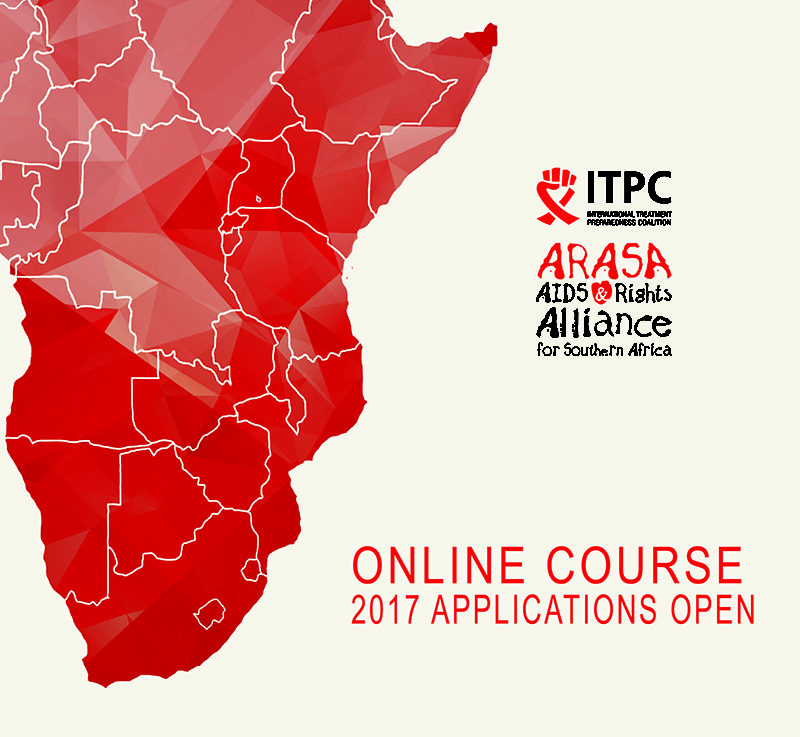 Making intellectual property issues easier to understand, to increase access to medicines – and you can apply now!
Making intellectual property issues easier to understand, to increase access to medicines – and you can apply now!
An online training course has been developed, focusing on reducing the barriers posed by intellectual property laws, which prevent access to life-saving essential medicines across Africa. Over four weeks, participants learn the essentials of intellectual property (IP) rights and international trade law, as they relate to access to treatment. This includes how IP law should, and should not be applied, along with the implications for access to affordable drugs and commodities, and what steps to take to prevent, or challenge abuses of the patent system.
It is the work of two organizations, partners of the Make Medicines Affordable campaign – the AIDS and Rights Alliance for Southern Africa (ARASA) and the Southern Africa Regional Programme on Access to Medicines and Diagnostics (SAPAM).
Our campaign partners, ARASA and SAPAM are jointly implementing a three-year programme, focusing on minimizing IP barriers to accessing HIV, TB and Hepatitis C medicines in three countries – Botswana, Mauritius and Zimbabwe – within the Southern African Development Community (SADC).
The political climate in Zimbabwe, and a shrinking civil society space, makes advocacy work challenging to roll out. By offering a course online it provides an opportunity to take part when there are barriers to running a physical training course.
The course leader, Moses Nkomo, is a lawyer from Zimbabwe and an intellectual property expert. He says: “When you initially explain that ‘intellectual property’ is preventing fair access to treatment, that itself becomes a barrier. The course breaks down what this means, in ways that people from different backgrounds or professions can understand. IP can be understood by everyone, not just lawyers. In fact it is critical that civil society and others are knowledgeable in this area to prevent large pharmaceutical companies from getting away with abuses of the patent system.”
IP can be understood by everyone, not just lawyers. In fact it is critical that civil society and others are knowledgeable in this area.
The 35 graduates, from 12 countries (Zimbabwe, Lesotho, Zambia, Malawi, Uganda, Kenya, Geneva, Brazil, India, Cameroon, South Africa, Botswana) were made up of civil society representatives, policymakers, religious leaders, health care providers, law enforcement officials and 10 people working at patent offices in Zimbabwe, Malawi, Cameroon and Côte d’Ivoire. The course is rigorous (69 people enrolled and 35 completed), with weekly quizzes to check level of understanding, and an overall course assignment. On completion of the course, participants leave with:
- An understanding and appreciation of the intricate linkages between access to essential HIV, TB and Hepatitis C medicines and the barriers presented by intellectual property legal and policy frameworks.
- Increased knowledge around the use of the flexibilities provided for by international trade agreements such as the Agreement on Trade-Related Aspects of Intellectual Property Rights (TRIPS), to improve access to medicines at a domestic level.
- Advocacy tools to equip them to utilize existing intellectual property flexibilities aimed at improving access to essential medicine.
Participant feedback showed that they needed more information on their own domestic situation, but also that they felt equipped to research this independently. Participants also reported feeling able to advise government on issues related to IP and access to medicines, and to share knowledge with peers and colleagues.
Particularly significant, for the participants working in the patent office, is that they feel they can now sharpen their examination of medicinal and pharmaceutical patents.
Future courses
The next course will take place from 6 November – 8 December 2017.
You can find all the information including how to apply here.
Sign up to our newsletter for announcements on future courses as well as other news from Make Medicines Affordable and our partners.




